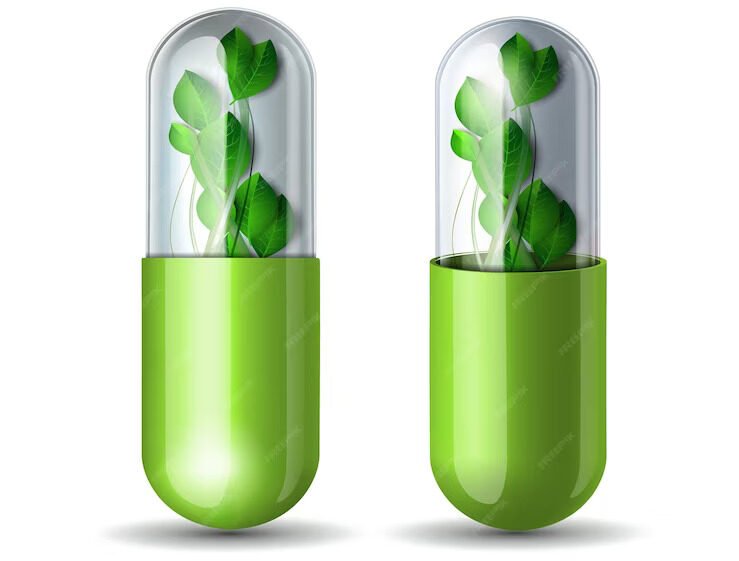The Green Revolution: Vegetable Capsules for Health and Wellness
- 1 The Increase in Vegetable Supplements
- 2 Advantages of Dietary Capsules
- 2.1 Fits the Needs of Vegetarians and Vegans
- 2.2 Hypoallergenic
- 2.3 Environmentally Conscious
- 2.4 Biodegradable
- 2.5 Halal and Kosher Certification
- 2.6 Versatile Vegetable Capsules
- 3 The Production Process
- 3.1 Extraction of Cellulose
- 3.2 Purification
- 3.3 Gelation
- 3.4 Capsule Formation
- 3.5 Drying
- 3.6 Quality Control
- 4 The Effects of Vegetable Capsules on the Environment
- 4.1 Decrease in Reliance on Animal Agriculture
- 4.2 Responsible Procurement
- 4.3 Biodegradability
- 4.4 Lessening of Carbon Footprint
- 5 Demand for Sustainable Health Solutions Growing
- 5.1 Consumer Education
- 5.2 Considerations of Ethics
- 5.3 Trends in Health and Wellness
- 5.4 Regulatory Assistance
- 6 Challenges and Things to Think About
- 6.1 Cost
- 6.2 Shelf Stability
- 6.3 Accessibility
- 6.4 Compatible Products
- 7 Conclusion
A revolution is underway in the always-changing field of health and wellness, one that is altering the way we take essential nutrients and supplements. Vegetable capsules, an eco-friendly and health-focused alternative to conventional gelatin capsules, have ushered in a new era of health-conscious alternatives. This “Green Revolution” is about the whole well-being of people and the earth, not simply the environment. We’ll go into the world of vegetable capsules in this post, looking at their advantages, production methods, environmental impact, and the rising need for environmentally friendly health solutions.
The Increase in Vegetable Supplements

Since ancient times, people have used capsules as a practical and efficient means of delivering nutrients and medications. Gelatin, a protein produced from animal collagen, is frequently used to make conventional capsules. Gelatin capsules have long been the standard, but they raise several issues for consumers who value their health and those who eat a plant-based diet.
Growing knowledge of these issues is what has led to the popularity of vegetable capsules. Due to their animal origin, gelatin capsules are not suited for vegetarians and vegans, and some people may develop allergies to them. Gelatin production also has an impact on the environment because it is a byproduct of the meat industry. These problems can be resolved using vegetable capsules. Typically, they are made of plant-based materials, cellulose being the most popular type, which is obtained from sources like pine trees or other woody plants.
This transition to plant-based capsules is in line with the broader trend of sustainability and a growing desire to make eco-aware decisions throughout life.
Advantages of Dietary Capsules
Fits the Needs of Vegetarians and Vegans
Vegetable capsules provide several noteworthy benefits, including the fact that they are fully plant-based and hence ideal for vegetarians and vegans. This diversity in dietary options makes it possible for a larger population to benefit from supplements and drugs without sacrificing their moral convictions or dietary constraints.
Hypoallergenic
Vegetable capsules are hypoallergenic, which means they are less likely than gelatin capsules to result in allergies or other negative responses. Gelatin allergies are not rare, and those who have them may have negative side effects when consuming items with gelatin as an ingredient. For people who have allergies or other sensitivities, vegetable capsules offer a safer alternative.
Environmentally Conscious
Vegetable capsules are made from plant sources, as the name implies, making them more environmentally friendly than gelatin capsules. Gelatin is made by processing animal collagen, which has a considerable negative environmental impact on the meat industry. Vegetable capsules, on the other hand, have a smaller carbon footprint because they are made from environmentally friendly plant components.
Biodegradable
Vegetable capsules decompose naturally over time and contribute less to landfill waste because they are biodegradable. This is in line with efforts made around the world to lessen plastic waste and the negative effects that non-biodegradable materials have on the environment.
Halal and Kosher Certification
Vegetable capsules are frequently the preferable option for people who follow particular dietary and religious standards, such as kosher or halal dietary laws. Compared to gelatin capsules, which might be made from non-kosher or non-halal sources, they are more likely to satisfy the requirements for these dietary certifications.
Versatile Vegetable Capsules
Versatile Vegetable capsules, like gelatin capsules, are adaptable and can encapsulate a variety of drugs and vitamins. This adaptability guarantees that people can get the therapies and nutrition they require without sacrificing their dietary preferences or ideals.
The Production Process
Understanding the production process for vegetable capsules will help you appreciate their eco-friendly and health-conscious qualities. Cellulose, a naturally occurring polymer present in plant cell walls, serves as the main component of vegetable capsules. The following steps are frequently included in the production process:
Extraction of Cellulose
Plant sources, such as cotton or pine trees, are used to extract cellulose. The environmental impact of this extraction method is minimal.
Purification
To ensure that the extracted cellulose is free of impurities and that the capsules fulfill rigorous requirements, they are purified.
Gelation
To produce a gel-like substance, cellulose is combined with water and a gelling agent, usually hypromellose.
Capsule Formation
Using specialized machinery, the gel-like substance is formed into capsules. The size and shape of the capsules can be altered to accommodate various dietary supplements or prescription drugs.
Drying
The extra moisture from the produced capsules is removed to keep them stable and suitable for long-term use.
Quality Control
To guarantee that the capsules fulfill safety, quality, and regulatory criteria, quality control procedures are in place at every stage of the production process.
The entire procedure is meticulously controlled to provide capsules free of impurities, allergies, and components sourced from animals.
The Effects of Vegetable Capsules on the Environment
Vegetable capsules have become more popular for a variety of reasons, but their lessened influence on the environment is one of the strongest. Here are some ways that vegetable capsules promote sustainability:
Decrease in Reliance on Animal Agriculture
Since gelatin is a byproduct of animal collagen, the manufacture of gelatin capsules is dependent on the meat industry. This process uses resource-intensive practices, such as animal farming, which increases water use, greenhouse gas emissions, and deforestation. Customers who choose veggie capsules lessen their reliance on animal husbandry and so indirectly address these environmental challenges.
Responsible Procurement
Cellulose, the main component of vegetable capsules, is derived from replenishable plant materials. Replanting these plants frequently ensures a continual supply without affecting the health of natural ecosystems. The creation of capsules has a reduced environmental impact thanks to sustainable sourcing techniques.
Biodegradability
Vegetable capsules degrade naturally over time because they are biodegradable. In contrast, many capsules made of plastic can linger in the environment for hundreds of years and cause plastic pollution. Biodegradable capsules support the international initiative to cut down on plastic waste and save ecosystems.
Lessening of Carbon Footprint
Compared to the production of gelatin capsules, vegetable capsules often have a reduced carbon footprint. Gelatin made from animal sources is processed using processes that need a lot of energy, is transported, and is refrigerated, all of which increase greenhouse gas emissions. On the other hand, vegetable capsules use less energy and leave less of a mark on the environment.
Demand for Sustainable Health Solutions Growing
The popularity of vegetable capsules is not a unique phenomenon, but rather a component of a larger movement towards long-term health solutions. Today’s consumers are more aware of how their decisions affect their well-being and the environment. They are looking for goods that share their ideals and promote a healthy earth as a result.
Consumer Education
Consumers now carefully consider the things they use because of the rising knowledge of environmental issues like plastic pollution and climate change. Today, many people prioritize sustainability and environmental friendliness in their decisions.
Considerations of Ethics
The desire for sustainable health solutions is also significantly influenced by ethical considerations. Concerns over how animals are treated in many businesses, such as the pharmaceutical and dietary supplement industries, are growing. Customers can match their dietary preferences with their ethical convictions by selecting veggie capsules.
Trends in Health and Wellness
The holistic approach to well-being is becoming more popular in the health and wellness sector, which is continually changing. Consumers are searching for items that promote long-term health and environmental sustainability rather than just short-term health advantages.
Regulatory Assistance
Regulatory organizations from many nations are realising how crucial sustainability is to the health industry. They are putting into place policies and requirements that promote the utilization of environmentally friendly resources and procedures in the manufacture of dietary supplements and pharmaceuticals.
Challenges and Things to Think About
Vegetable capsules provide a lot of advantages, but there are also some difficulties and things to take into account:
Cost
Producing vegetable capsules can cost more than producing gelatin capsules. The sourcing and processing of plant-based materials are to blame for the price discrepancy. Nevertheless, economies of scale could eventually help cut costs as the market for vegetable capsules grows.
Shelf Stability
Compared to gelatin capsules, vegetable capsules may have slightly different shelf stability properties. The stability and efficacy of a product must be guaranteed by the manufacturer for the whole planned shelf life.
Accessibility
Vegetable capsules might not be readily available where you live or for the particular nutrients or drugs you need. Since not all producers use vegetable capsules, customers would need to look for particular brands or goods.
Compatible Products
Although vegetable capsules are adaptable, some nutrients or drugs might benefit from particular capsule materials or types for the best delivery. To verify compatibility, it is crucial to speak with medical professionals or product manufacturers.
Conclusion
Vegetable capsules have sparked a “Green Revolution” in health and wellness that is a step in the right direction towards a more inclusive and sustainable future. These capsules have many advantages, such as being suitable for vegetarians and vegans, having hypoallergenic qualities, and having a smaller environmental impact. The demand for environmentally friendly health solutions like vegetable capsules is anticipated to rise as people become more aware of their lifestyle choices in terms of health and how they affect the environment.
The health and wellness business is evolving towards greater sustainability and a more holistic approach to well-being, despite problems and concerns that remain. By embracing the Green Revolution, we prioritize both our health and the health of the planet, making decisions that are good for both present and future generations.


















